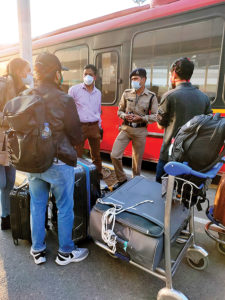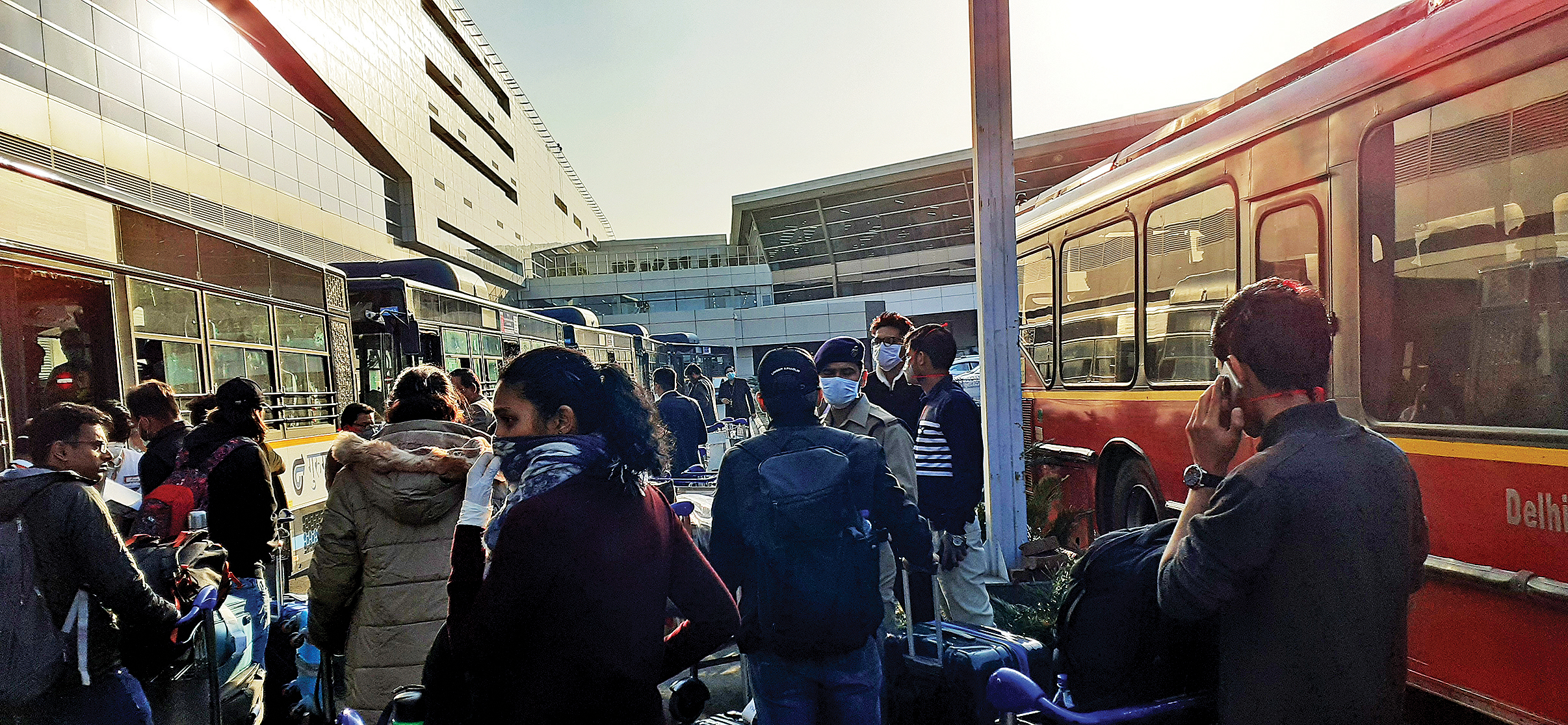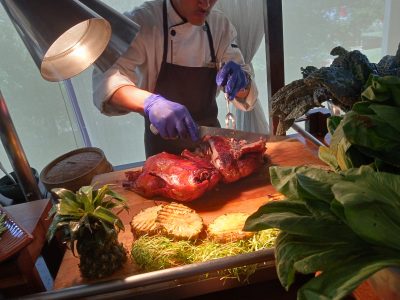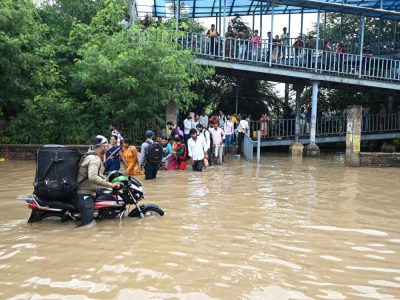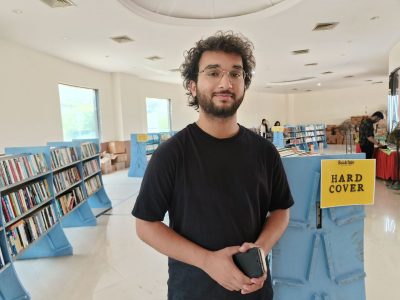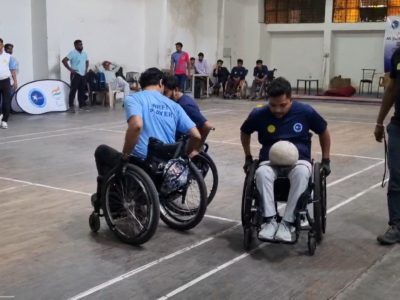Patriot speaks to few of the 500 passengers from Paris and Frankfurt who were detained at the airport for over eight hours for Coronavirus screening
ON MARCH 15, Terminal 3 of Indira Gandhi International Airport didn’t look as busy as the usual days. There was not much of a crowd, barring one spot at the back gate. The passengers of two flights that had landed in Delhi that day from Paris and Frankfurt — 500 of them — were kept inside the airport long after they had deboarded.
The purpose was to screen them for Coronavirus, and then transfer them to facilities in Dwarka, Gurugram and Manesar for elaborate testing.
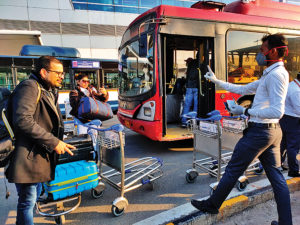
Tanvi, a student travelling back from Paris, is one of the many who travelled back to Delhi from France. Her ordeal lasted for hours.
We catch up with her outside the international airport at 5:30 pm as she runs from one official to another, looking for her passport. Like Tanvi, there are several others who wear a tired and lost look on their face. Most of them have no idea what’s in store for them.
Though Tanvi landed at 9:15 in the morning, she has had nothing to drink or eat for hours.
“The moment we landed here, we were taken to another queue where they checked our temperatures. Everything was fine until then. After a while they conveyed to us that we are quarantining your whole flight but did not give further updates. Landing here after such a long flight, we still haven’t had water or food,” she says.
Visibly tired, she attentively listens to the names being called out for retrieval of passports. “At around 3 pm again they said ‘Give us your passports for immigration’, and then informed us that we will be taken to the centres. It’s been more than two hours but I still haven’t got back my
passport.”
As buses full of people left the airport, many more kept coming out in queues from a side gate of the terminal. Some of the family members and parents waited to meet their children but were not allowed to give them any food.
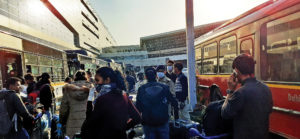
“We know that it’s for our own safety but there should be proper management. One of my friends has a connecting flight to Odisha. She had to miss her flight but her luggage has reached there.”
Echoing her, others agreed that they do not have any problem with following due procedures but this kind of mismanagement put them in more danger. “They are putting 400 people in the same queue to put the quarantine stamps and that is totally unsafe. Chances of the virus being spread there is higher,” adds Tanvi as she still awaits her passport.
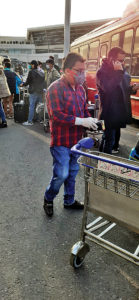
Ranjan’s struggle to know the whereabouts of his five-months pregnant wife took him more than five hours. Ranjan was trying to get hold of her luggage, who was flying back from Germany, “She has now been taken to a hospital in Gurugram but I am not aware of the procedure. The flight landed at 9:30 am and after five hours I finally got to know where she has been taken. But I am still waiting for her luggage.”
Rekha Jain was waiting for daughter Rupika to return from Paris after almost a year of not meeting her. “When the Coronavirus spread in Europe, I called her and asked her to come home immediately. So she boarded a flight back home yesterday at 9 pm. She landed here at around 9.30, and has been stranded here for more than eight hours now,” she says.
Looking impatiently at the door through which all the passengers were exiting, Rekha scanned the faces of the passengers, hoping that she would spot her daughter. “I called her, and she said, that the authorities were treating them inhumanely”. She says that her daughter had neither eaten anything nor had a drop of water ever since her flight landed. Her passport was taken away, and they were keeping them in a pretty confined space.
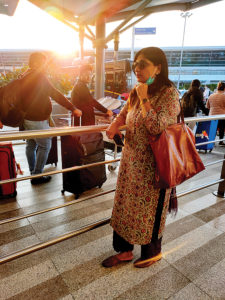
“I have no idea where they would take my daughter now. I even asked the authorities to send some food I bought for her, but they refused. My child is hungry and I can do nothing about it,” laments Rekha. She worries that Rupika might contract the Coronavirus at the airport itself, as a look of concern shadows over her face.
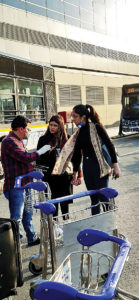
Surinder and Priya, a newly married couple, had gone for a Europe tour for their honeymoon, but had to cut it short because of the sudden outbreak of the Coronavirus. They booked a flight from Frankfurt to Delhi, and a connecting flight back home to Chandigarh.
However, what they experienced at the airport was nothing short of horrific. “We feel like criminals, nobody is telling us anything, everything is so mismanaged,” complains Surinder, adding that they had not eaten anything for the 7-8 hours that they have been stranded, and like the others their passport had also been seized.
“We have no idea where they are taking us and what facilities they will provide us. We are very worried about when we can go home,” says a worried Priya.
Contrary to the passengers’ claims however, Vinod Bhardwaj, Deputy Presiding Officer, District Disaster Management Association (South West Delhi), who was looking over the operations of the screening and checking of the passengers at the airport, says that passengers were given utmost care.
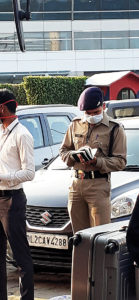
“All passengers have been kept at a distance of one metre each, as prescribed by the WHO,” he claims. “We are doing everything we can in our capacity, and even we haven’t slept for nights because of this situation. It would be great if they could just cooperate with us,” he adds.
When asked why the passengers were not given any food and water, Bhardwaj says that it is not their responsibility. The passengers are however free to buy anything from the food stalls inside the airport. When asked for how many days the passengers will be kept under observation, Bhardwaj said that all of them will have to be quarantined for 14 days at the facilities set up by the Delhi government. “Doctors, police and all kinds of staff will be present there, and we will also provide them with food and water. All we need is cooperation in these troubled times,” he concludes.
